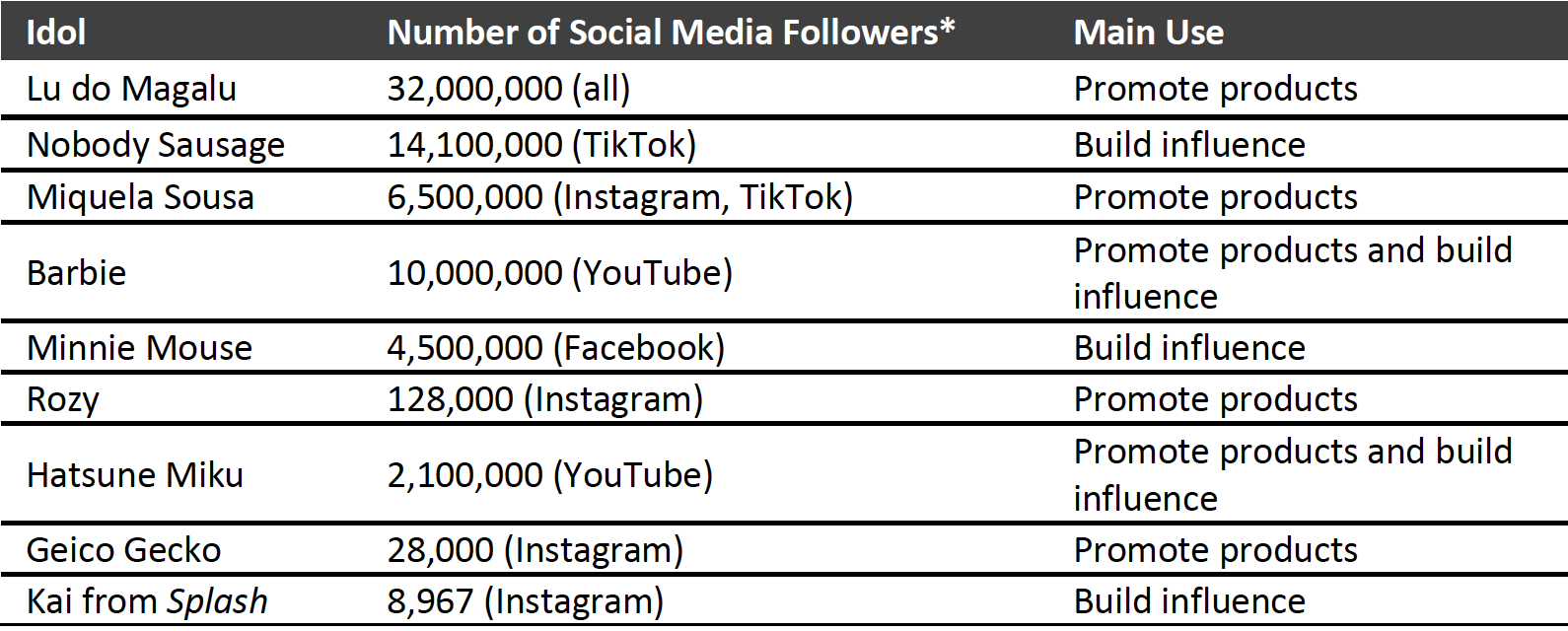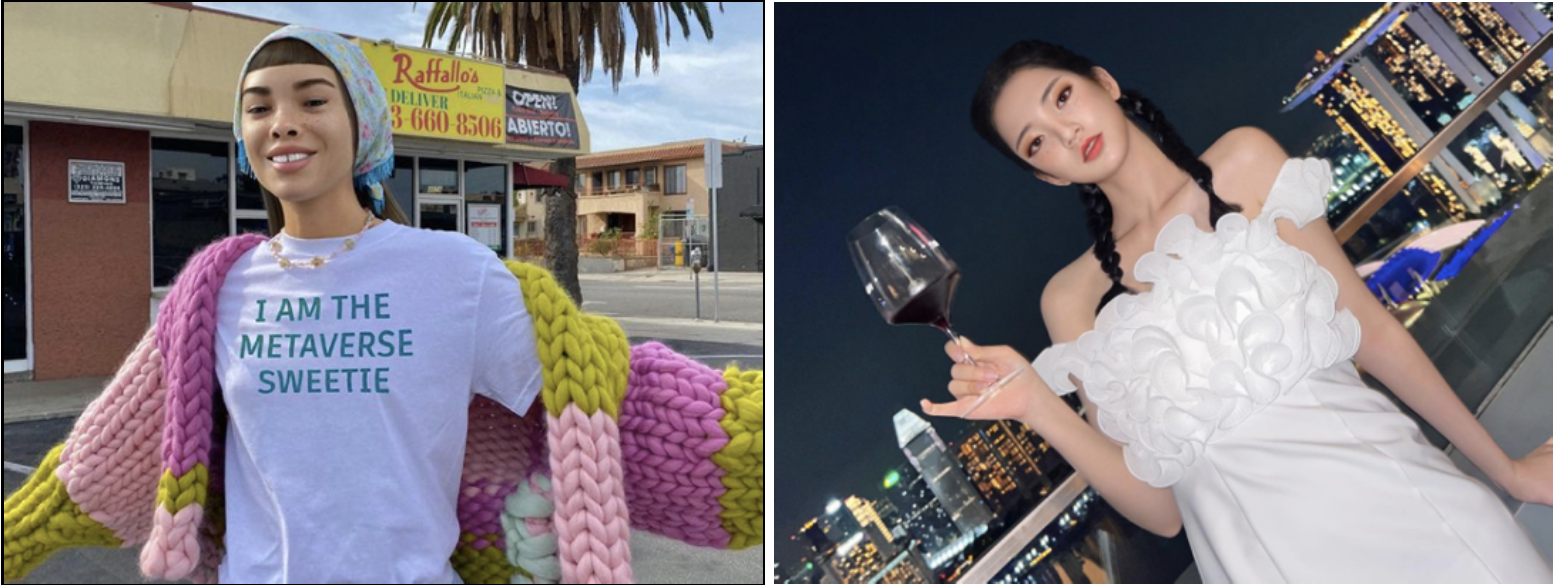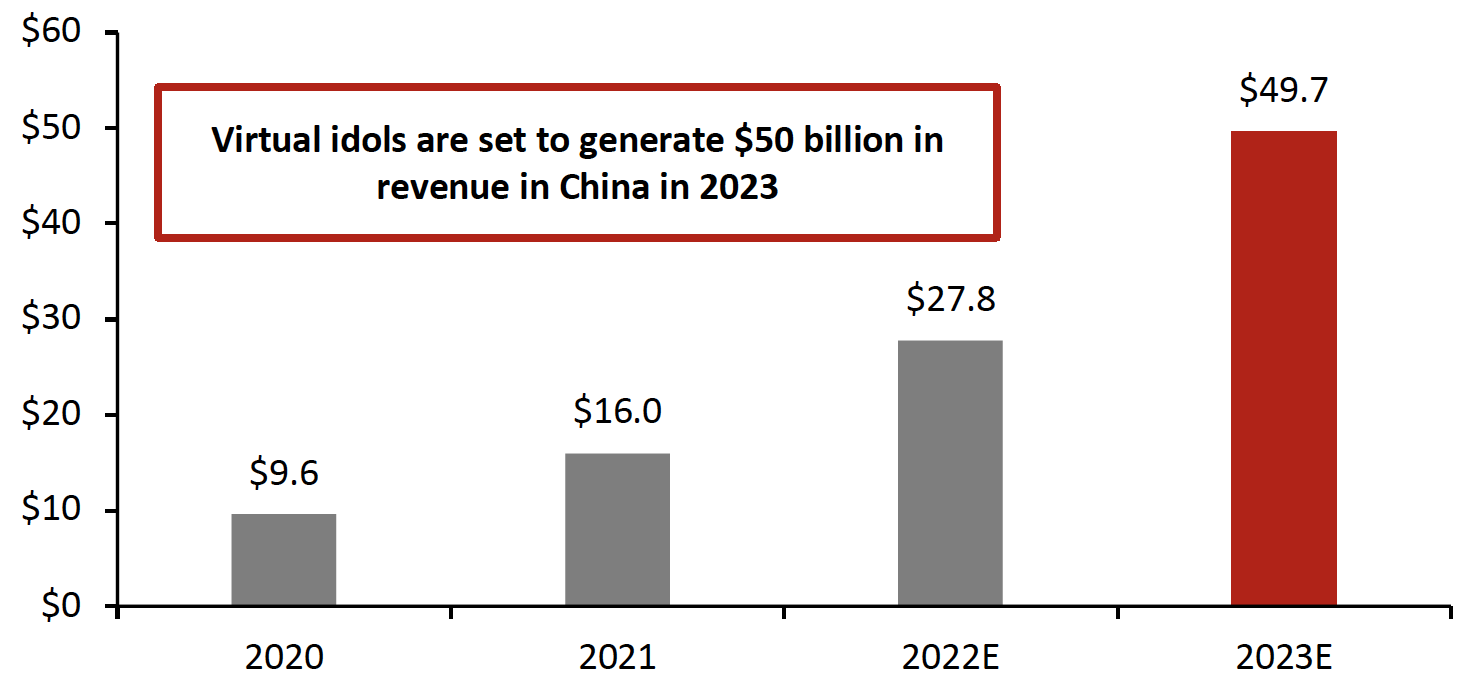
albert Chan
Metaverse Latest
Metaverse technologies and virtual gaming have surged in popularity during the Covid-19 pandemic and are continuing to evolve, grow, and converge each month. Coresight Research has identified the expanding metaverse as a key trend to watch in global retail in 2022 and beyond.
Our Metaverse Latest series provides regular updates on metaverse developments, showing how key players and new entrants are seizing opportunities in the space. We also discuss metaverse trends we have seen recently.
In this report, we present developments as of June 13, 2022, and explore the rise of meta humans as influencers.
Recent Metaverse Developments
Virtual Worlds and Platforms
- On May 25, 2022, gaming giant Niantic, which created Pokémon Go, announced that it was building a new augmented reality (AR) social networking application, Campfire, to help mobile 3D gamers connect with one another. Along with the app, Niantic is also releasing its highly-anticipated virtual positioning system.
- On May 25, 2022, one of the largest Layer 2 blockchain protocols, Immutable, announced a partnership with blockchain gaming developer Kongregate in which the companies will launch a $40 million fund for blockchain gaming and metaverse platforms.
- On May 27, 2022, AR startup Jadu announced that it had raised $36 million to construct a metaverse experience that will allow users to travel to real-world locations with their NFT (non-fungible token) avatars.
- On May 31, 2022, game developer The Tiny Digital Factory, which has partnerships with McLaren, Porsche, Mercedes and Ford, revealed that it was constructing a blockchain-based metaverse driving game, Infinite Drive, and will release NFTs of cars for users.
- On May 31, 2022, in collaboration with Mastercard and MetaPride Land, Decentraland announced a permanent experience for the LGBTQIA+ community. Kicking off the experience is the Metaverse Pride month-long pride celebration, which began with a parade on June 11, 2022, and features immersive experiences, collectibles, entertainment from music icons and curated content.
- On June 1, 2022, AsiaPay, a leading payment solutions provider in Asia, announced its partnership with Moonland Metaverse, a platform based on the Solana blockchain that focuses on ease of consumer use and offers commercialization and monetization opportunities. AsiaPay will provide e-commerce merchants with several metaverse tools that facilitate trade.
- On June 8, 2022, Neal Stephenson, who first coined the term “metaverse” in his 1992 novel, “Snow Crash,” revealed that he is working to bring his vision to life by creating a metaverse-focused blockchain, Lamina1.
Brands and Retailers
- On May 25, 2022, gaming retailer GameStop launched a non-custodial Ethereum wallet for customers to hold cryptocurrencies and digital assets such as NFTs. GameStop will also be launching its own NFT marketplace.
- On May 25, 2022, sportswear brand Puma partnered with digital studio Wonder Works to launch an immersive sports-based experience within Roblox. Players are able to customize their avatars with hyper-realistic Puma clothing, unlocking new levels and wearable prizes.
- On May 25, 2022, in partnership with Microsoft’s industrial metaverse, aerospace company and vehicle manufacturer Kawasaki announced that it would be using the Microsoft HoloLens headset for workers in its factories, overlaying digital information onto real-world items.
- On May 27, 2022, Gucci opened “Gucci Town” within Roblox, a permanent space for users, fans and customers to interact within. Experiences will change constantly and will feature competitions and showcase artwork.
- On May 30, 2022, Chinese online shopping platform Taobao launched a metaverse shopping mall for China’s 6.18 shopping festival. Using phones, customers can guide their avatars through a fully immersive virtual shopping experience, engaging in interactive activities in 3D stores.
- On May 31, 2022, hoping to create a connection with Gen Z, children’s clothing brand Balabala forayed into the metaverse, creating a hyper-realistic virtual human, named Rainy, to serve as a brand ambassador.
- On June 1, 2022, media and entertainment company Complex hosted its third annual virtual shopping event, Complexland, which was initially launched during the pandemic in 2020 and transformed into a Web 3.0 experience in 2021 and 2022. Dozens of notable brands participated, including Billionaire Boys Club, Foot Locker, New Balance and Pacsun.
- On June 1, 2022, in celebration of Pride Month, L’Oréal-owned makeup brand NYX Professional Makeup joined The Sandbox by launching an exclusive collection of avatars with various different feature options—such as skin tone, sexual orientation and gender identification—to improve metaverse inclusivity and diversity.
- On June 2, 2022, luxury brand Prada announced a monthly series of NFT drops, titled Timecapsule, which would take place on the first Thursday of every month. It also revealed that it created a community Discord server called “Prada Crypted.” Customers who own NFTs will have access to exclusive merchandise and VIP experiences for future drops.
- On June 2, 2022, fast-food chain Chipotle partnered with crypto payment processor Flexa to begin accepting over 90 crypto tokens for payment, including Bitcoin, Ethereum and Solana.
- On June 3, 2022, streetwear brand BAPE, or A Bathing Ape, hosted a “(B)APETAVERSE” party in Decentraland. The experience featured 3D NFTs, allowed customers to unlock perks and offered exclusive drops, raffles and curated content.
- On June 7, 2022, apparel retailer Gap Inc. unveiled its third collection of NFTs in partnership with artist and former soccer player Demit Omphroy. The collaboration also includes a T-shirt collection sold in physical stores.
- On June 7, 2022, customer computer and electronics provider iBUYPOWER announced a partnership with leading Solana metaverse Star Atlas to become the official PC of the platform.
- On June 7, 2022, car manufacturer Hyundai’s credit card business, Hyundai Card, announced its intentions to create an NFT marketplace and digital asset wallet.
- On June 8, 2022, France-based luxury cosmetics and perfume brand Givenchy revealed one of the first-ever immersive beauty experiences within the Roblox platform. Givenchy is focusing its Roblox universe on virtual fashion items, competitions and avatar beauty.
- On June 8, 2022, Kentucky-based distillery Angel Envy, which is owned by Bacardi, opened a metaverse distillery fit with themed games, NFT wearables and proof-of-attendance badges for users to earn prizes and loyalty rewards.
- On June 8, 2022, Estée Lauder’s venerable cosmetics brand, Clinique, announced an NFT campaign aimed at improving metaverse diversity, collaborating with various makeup artists from all over the world.
- On June 8, 2022, toymaker Mattel announced a partnership with Forever 21 that will feature a limited-edition Barbie-themed summer 2022 collection of apparel and accessories. The collection and wearables will also be available for Roblox avatars.
- On June 9, 2022, Mattel announced a partnership with Web 3.0 infrastructure firm OnChain Studios to develop an NFT and collectible marketplace, Cryptoys, for Flow blockchain. Mattel has previously created an NFT marketplace for Hot Wheels collectibles.
- On June 9, 2022, Budweiser announced that it had partnered with blockchain game Zed Run, giving customers the opportunity to race with Budweiser “Clydesdale” horses in a Budweiser-themed race track.
- On June 9, 2022, Hyundai hosted a release party in Decentraland’s Museum District for its new Creta launch. Hyundai is giving away free avatar wearables, hosting driving experiences and sponsoring virtual concerts for the party.
- On June 9, 2022, Givenchy announced that it was launching a beauty house in summer 2022 within the Roblox environment. Users will be able to virtually apply cosmetics to avatars and enjoy immersive experiences to interact with the brand.
- On June 12, 2022, audio company iHeartMedia revealed its plans to enter the metaverse, partnering with Roblox to bring unique experiences, products and events to fans. The company will also release NFTs through a separate marketplace.
Technology and Access
- On May 25, 2022, headset developer and retailer Magic Leap announced that its Magic Leap 1 headset, originally released in 2018 for $2,000, would be available to the public for just $549.
- On May 25, 2022, Andreessen Horowitz, a prominent venture capital firm investing in some of the largest Web 3.0 and blockchain projects, announced a fourth cryptocurrency fund, totaling $4.5 billion, despite the ongoing cryptocurrency and NFT crash.
- On May 30, 2022, China-based virtual reality (VR) company StepVR announced a new immersive experience in which users would be able to step into “an open-air box” and allow users to experience a virtual world in a way not possible with only a headset.
- On May 31, 2022, community app store Magic Store, which allows users to access all crypto apps they use in one location, announced that it had integrated the IQ Protocol, which will allow users to purchase and enjoy the benefits of digital assets and NFTs that they cannot afford without the need for collateral.
- On June 2, 2022, brand NFT curation platform Fr0ntierX announced a partnership with Layer 2 Ethereum solution Immutable X that will allow brands to mint carbon-neutral NFTs with zero gas fees.
- On June 5, 2022, Flow, a decentralized blockchain, announced that it had surpassed $1 billion in NFT sales—a significant milestone given the ongoing volatility within Web 3.0 assets.
- On June 6, 2022, in a big step for the visibility of blockchain gaming, game developer Gala Games announced that it would start listing its blockchain games in the Epic Games store, which has more than 190 million users.
- On June 6, 2022, Neighbor, a metaverse studio specializing in the Fortnite game, was established. The platform will gather top Fortnite creators and begin accepting orders to create metaverse experiences for businesses, brands and retailers.
- On June 7, 2022, Cronos, the blockchain developed by Crypto.com, announced a new $100 million fund to support blockchain and cryptocurrency startups within its ecosystem, offering $100,000–$300,000 per project.
- On June 8, 2022, in a major step for the sustainability of NFTs, technology giant Salesforce announced that it was launching a cloud-based pilot program, enabling brands and businesses to mint and sell NFTs and manage their NFT businesses.
- On June 8, 2022, London-based venture firm Felix Capital announced that it would create a $600 million fund to invest in Web 3.0 ventures.
Meta Humans Become Influencers
Virtual idols and digital humans are on the rise, and with rapid advances in AR and VR, as well as gaming engines, many of these idols are becoming indistinguishable from real-world humans online.
[caption id="attachment_150316" align="aligncenter" width="550"] Lu do Magalu, a virtual idol based in South America with 5.9 million Instagram followers: 2008 (left) vs. 2022 (right)
Lu do Magalu, a virtual idol based in South America with 5.9 million Instagram followers: 2008 (left) vs. 2022 (right)Source: Magazine Luiza[/caption] Real-world influencers, including celebrities, on Web 2.0 social media websites such as Facebook, Instagram, Snapchat and Twitter have become popular sales channels for many brands and retailers. However, in this form of advertising, human influencers will ultimately have control over product narrative and presentation. Forecasting changes in demand and taste also becomes more difficult, with less direct customer interaction. Web 3.0 eliminates these issues, allowing brands and retailers to control virtual idols for not only social media campaigns but also video advertisements, NFT advertising and building a presence within virtual gaming and social metaverse platforms, such as Roblox and Decentraland. Popular virtual idols generating millions of social media interactions are also valuable sources of consumer data and can be employed by a number of businesses operating in various sectors. Virtual idols, which can be cartoon characters (such as with Barbie and Minnie Mouse), are generally used to build influence and interaction around a brand or concept among a younger, social media-savvy generation. Meta humans such as Lu do Magalu are hyper-realistic and can be used to advertise real-world products, such as through video campaigns (via multiple platforms, including YouTube and social media), similar to real-world influencers.
Figure 1. Selected Popular Virtual Influencers and Their Main Uses [caption id="attachment_150317" align="aligncenter" width="550"]
 *As of June 17, 2022
*As of June 17, 2022Source: Virtualhumans.org/Coresight Research[/caption] As metaverse popularity and the idea of living within virtual environments and worlds increases—particularly among Gen Zers—idols such as Kai from Roblox-based game Splash (pictured below), are being used to reach and interact with consumers within massive multiplayer games. Kai’s popularity and potential led to a $20 million seed investment for Splash. These types of idols can be used to help brands and retailers establish a footing within virtual worlds, connecting with its unique community. Using virtual idols as part of influencer marketing campaigns also helps brands to steer clear of the controversy and drama that typically surround celebrities. [caption id="attachment_150318" align="aligncenter" width="300"]
 Virtual idol Kai in Roblox’s Splash
Virtual idol Kai in Roblox’s SplashSource: Roblox[/caption] As with many other emerging and metaverse technologies, the US has been slow to adopt and make use of the huge potential of meta humans. Asia—particularly China—has been a popular region for virtual idols and is now home to many trends and virtual influencer marketing campaigns that could have staying power as Web 3.0 continues to evolve and grow in global popularity. One reason for the rising popularity of virtual idols in China is the need to combat product counterfeiting: in 2020, China and Hong Kong accounted for 83% of the global value of counterfeit goods, a roughly $400 billion market, according to the Office of US Trade Representative. Virtual idols are difficult to replicate and therefore help ensure that customers who interact with the brand’s idol in legitimate settings are buying an authentic virtual (NFT) or real product. Popular virtual influencers globally, not based on any real-world person, are already earning millions in brand sponsorships. Korea-based idol Rozy, who made her debut in mid-2021, has already partnered with over 100 companies and earned over $12 million, according to Asia Economy. Similarly, idol Miquela Sousa is estimated to earn over $10 million per year, according to online marketplace OnBuy. [caption id="attachment_150319" align="aligncenter" width="550"]
 Virtual idols Miquela Sousa (left) and Rozy (right)
Virtual idols Miquela Sousa (left) and Rozy (right)Source: Brud/Sidus Studio-X[/caption] By using virtual idols for targeted marketing and advertising campaigns across multiple media platforms, businesses and retailers will generate an additional estimated $50 billion in revenue in 2023, according to iiMedia Research (see Figure 2).
Figure 2. Potential Value* Provided by Virtual Idols in China (USD Bil.) [caption id="attachment_150320" align="aligncenter" width="550"]
 *Additional revenue generated
*Additional revenue generatedCNY converted to USD as of June 17, 2022
Source: iiMedia Research[/caption]
Brands can use virtual idols to host livestreaming advertising campaigns. Livestreaming is a popular channel in China: 100% of Chinese consumers surveyed had watched and/or purchased products from a shoppable livestream, according to a Coresight Research survey conducted in May 2022.
Several notable brands have already engaged in advertising campaigns involving China-based virtual idols, as well as other idols from all over Asia.
- Puma: Puma is highly involved in Web 3.0, having sold several NFT collections and participated in Decentraland’s Metaverse Fashion Week. In 2020, the brand also created its very own virtual idol for Southeast Asia: Maya was responsible for launching the Puma Rider shoe. Maya’s personality, appearance and interests will evolve over time, and Puma plans to utilize the idol across multiple sales and advertising channels.
 A Puma advertising campaign featuring virtual idol Maya
A Puma advertising campaign featuring virtual idol MayaSource: Puma[/caption]
- IKEA: Through its collaboration with Japan-based virtual idol Imma, IKEA has previously brought virtual idols to life within physical adverts and in-store installations in Tokyo, Japan. Over the course of three days, customers in IKEA stores could view Imma’s life, watching as she lounged on the couch and completed everyday activities. The retailer’s goal was to create a sense of comfort behind the brand by demonstrating how a hyper-realistic idol, almost indistinguishable from a real person, is comfortably living in her IKEA-dressed apartment.
- Tiffany & Co.: In early 2020, jewelry retailer Tiffany & Co. announced a partnership with China-based virtual idol AYAYI, who released promotional materials to over 750,000 followers on her personal Weibo for the Tiffany Knot collection. AYAYI has also worked with MAC Cosmetics and L’Oréal Paris.
 AYAYI advertising Tiffany Knot Collection on Weibo
AYAYI advertising Tiffany Knot Collection on WeiboSource: AYAYI Weibo/Retail in Asia[/caption]
- L’Oréal: L’Oréal has been utilizing virtual idols for over a year, having created Mr. Ou, an anime-style 2D character that works within the beauty industry and promotes environmentally sustainable choices and products. Carefully crafted for product narrative, Mr. Ou assumes the persona of a Chinese-French entrepreneur who is passionate about sustainability in the beauty industry.
- For more about how brands and retailers can incorporate virtual idols into advertising campaigns, please refer to our Playbook on Strategies for Retailers to Monetize the Metaverse
What We Think
- Web 3.0 and its important underlying technologies, including the AR tools used to create hyper-realistic virtual idols, are still in their early days but are beginning to increase in popularity, as is livestreaming e-commerce globally. Using virtual idols and influencers can help retailers to maintain control over product and brand narrative in a rapidly surging sales channel.
- Virtual idols can come in many different forms—they may start as cartoon characters, be hyper-realistic humans for real-world products, exist exclusively in virtual worlds and metaverses, and/or continue change appearance as AR tools and consumer tastes evolve. Brands and retailers are already beginning to use them for targeted advertising campaigns, and the control and narrative they are able to craft around their products using virtual idols is indispensable compared with traditional influencer marketing. Brands and retailers should begin to take advantage of virtual idols to stimulate customer interaction and reach new markets with carefully outlined product narrative goals.